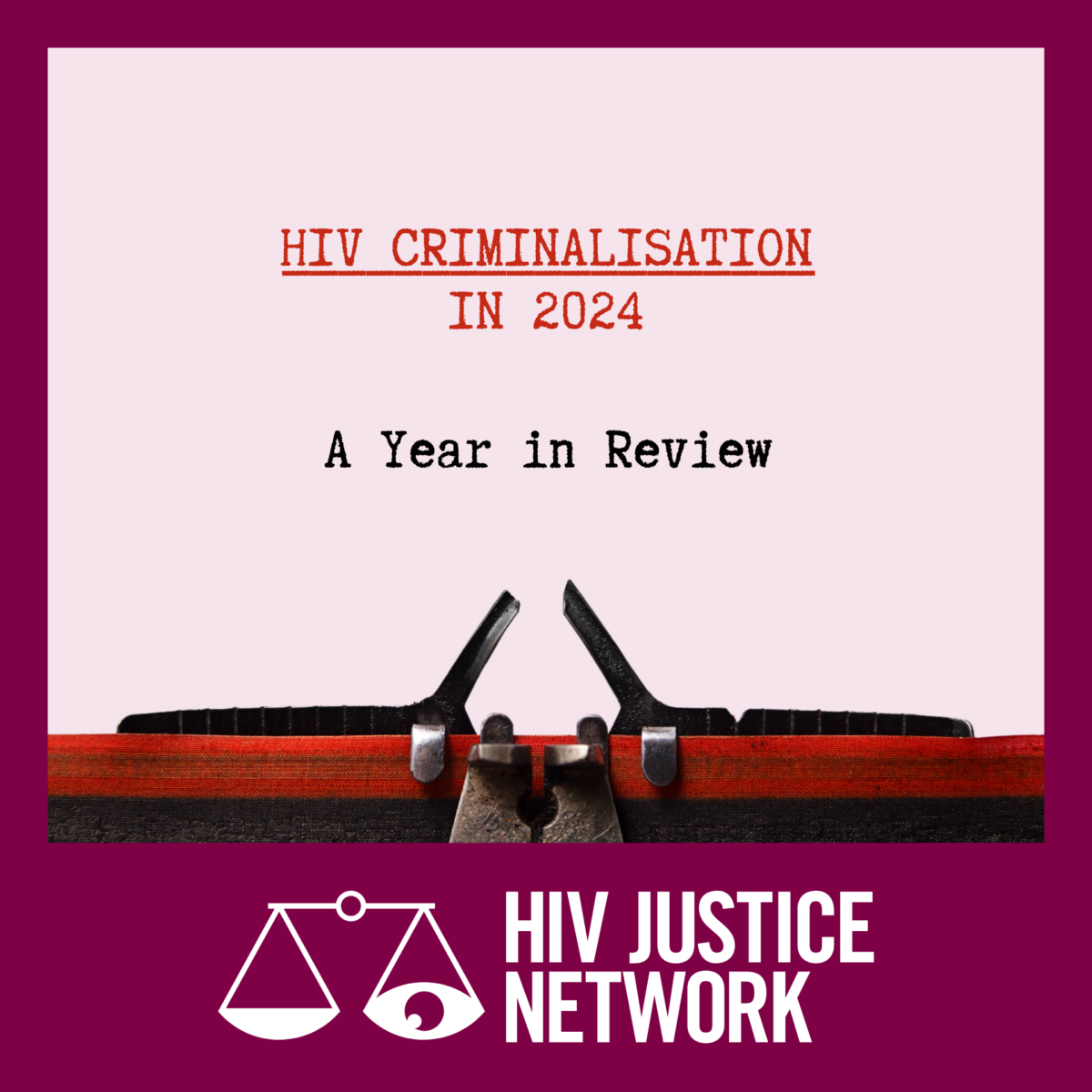
As the world grappled with shifting political landscapes and evolving public health priorities, the fight against HIV criminalisation remained a critical, yet often overlooked, human rights issue. The HIV Justice Network and our HIV JUSTICE WORLDWIDE coalition partners navigated a year of both challenges and progress, underscoring the ongoing need for vigilance and advocacy in the face of unjust HIV-related laws and practices.
Rising Case Numbers and Persistent Challenges
In 2024, reported HIV criminalisation cases rose to 65, compared with 57 in 2023 and 50 in 2022. While these numbers remain lower than the 119 cases prior to COVID in 2019, they highlight a troubling upward trend. Cases were documented across 20 countries, with Russia and the United States leading at 26 and 11 cases, respectively. Other notable contributors included Spain (3), Argentina (2), Belarus (2), Senegal (2), and Singapore (2).
In Panama, a 14-year prison sentence for alleged HIV transmission marked the country’s first reported case. Uruguay also saw its first case, where spitting was classified as an ‘assault on health,’ despite no risk of transmission.
These figures only scratch the surface, as media-reported cases represent a fraction of the actual global burden. Civil society organisations uncovered hundreds of previously unreported cases, particularly in Eastern Europe and Central Asia, while the Williams Institute’s research in the U.S. revealed hundreds more, including detailed analyses in Indiana, Maryland, Mississippi, and Ohio.
High-Profile Cases and Intersectional Injustices
Several cases drew international attention in 2024, shedding light on the intersectional injustices of HIV criminalisation.
In Qatar, a British-Mexican national’s arrest after a Grindr sting operation also emphasised the perilous intersection of HIV status, gay identity, and discriminatory laws. Following a public campaign and diplomatic efforts, the individual was released and allowed to leave the country. Similarly, Senegal reported two cases stemming from police raids on LGBTQ individuals, further highlighting how HIV criminalisation disproportionately affects other criminalised and marginalised groups.
A particularly concerning case in South Africa resulted in a life sentence plus ten years for a soldier accused of HIV transmission and non-disclosure. The verdict reflected outdated views equating HIV to a death sentence and reinforced harmful legal interpretations equating HIV non-disclosure with rape. Previously only Canada had framed HIV non-disclosure in this way, and this framing has been roundly criticised by HIV and human rights groups in the country and rejected by Canada’s Justice Committee.
Legal Reforms: Progress and Setbacks
Efforts to modernise or repeal unjust HIV laws gained ground in 2024, with notable victories including:
- Mexico: Repeal of ‘danger of contagion’ laws in Colima and Mexico City.
- Tennessee, U.S.: Elimination of mandatory sex offender registration for ‘aggravated prostitution’.
- Singapore: Introduction of an undetectable viral load defence in HIV exposure laws.
In Uganda, the Constitutional Court struck down the death penalty provision in the Anti-Homosexuality Act 2023, but upheld other regressive aspects, highlighting the mixed fortunes of legal challenges in hostile environments.
There was also disappointing news from Canada, where a federal review of its legal approach to HIV non-disclosure was abandoned, despite tireless advocacy efforts. Other retrogressive moves included Guinea’s harsher penalties for ‘intentional HIV transmission’, Tennessee’s expansion of aggravated rape provisions to include people living with HIV, and reports from China that the municipality of Chongqing was revising laws concerning STI transmission as part of a broader crackdown on HIV.
Policy Developments and Advocacy Wins
Policy shifts in 2024 reflected growing recognition of human rights in public health.
In Uzbekistan, the Ministry of Health reduced the number of prohibited professions, including hairdressing, for people living with HIV.
In the U.S., once the global leader in HIV criminalisation, significant legal and policy improvements continue to be secured. Updated guidelines allowed parents living with HIV to breastfeed, while increased transparency on molecular HIV surveillance marked a small but critical step forward. Nevertheless, unscientific prosecutions were still seen in the U.S. in 2024: conduct that carries little to no risk of transmission was criminalised, including spitting, throwing blood, and sex with an undetectable viral load.
Dedicated advocacy also prevented new criminalisation laws in Uganda and Zimbabwe, the latter rejecting an attempt to reinstate a repealed law criminalising HIV transmission. These successes underscore the power of collective action in resisting harmful legislation.
Courts Upholding Justice
Courts in several countries provided a beacon of hope by rejecting unjust prosecutions:
- Kenya: A court threw out a baseless charge of deliberate HIV transmission against a domestic worker accused of spitting in food.
- Italy: A man was acquitted due to a ‘very low viral load’, with the court recognising the negligible transmission risk.
- Greece: The European Court of Human Rights ruled that the forced testing and public shaming of sex workers violated their rights, setting a vital precedent.
The Road Ahead
Despite these wins, the persistence of HIV criminalisation laws and prosecutions and their disproportionate impact on marginalised communities serve as a sobering reminder of the work still required. As we move into 2025, facing an ever-emboldened anti-rights movement, we remain committed to challenging unjust laws, building power with affected communities, and advocating for evidence-based, rights-affirming approaches.
In a year marked by both setbacks and progress, the global movement against HIV criminalisation demonstrated resilience and resolve. The delicate balance of successes and challenges reminds us that vigilance, advocacy, and solidarity are more crucial than ever in our fight for justice and equality.